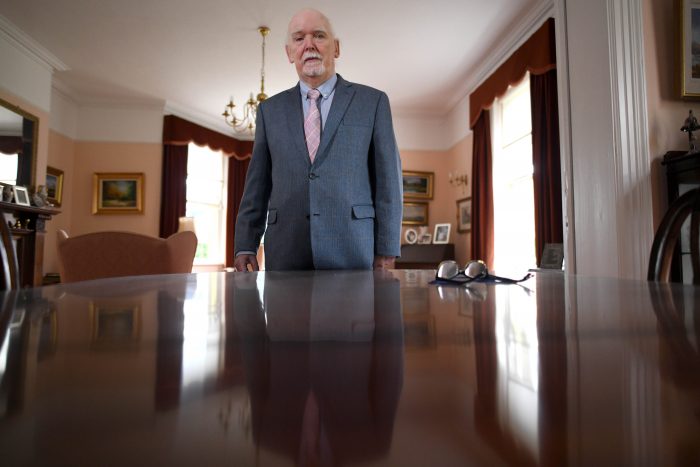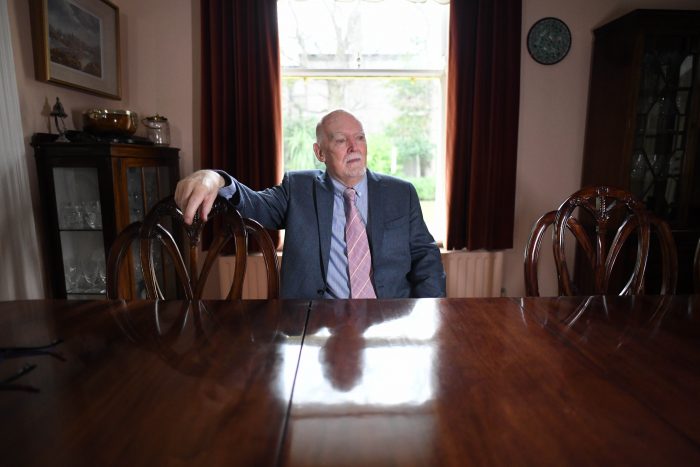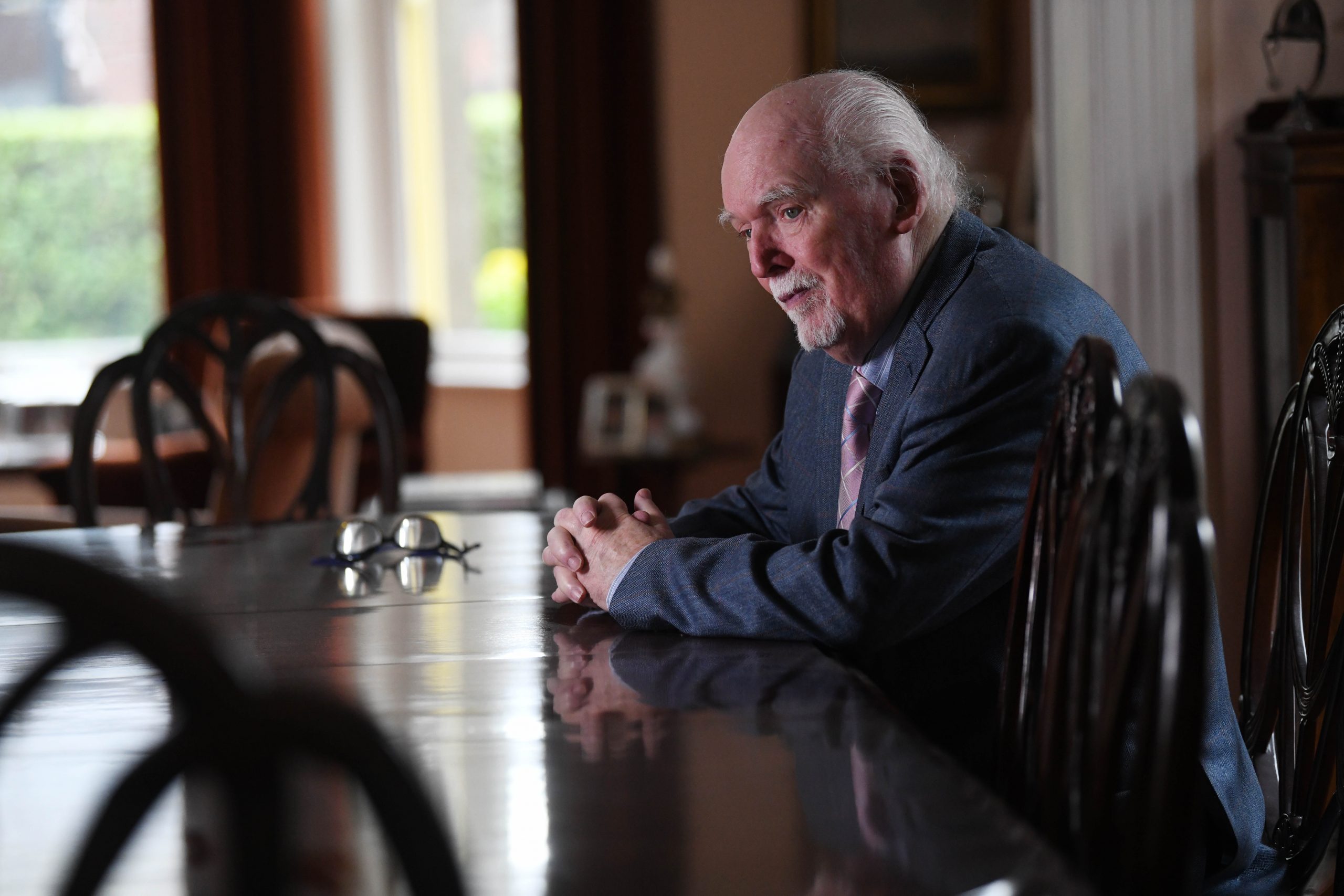Paul Mackay had just finished talking. He had just given an impassioned five-minute speech at the final extraordinary general meeting of the Irish Credit Bureau. Mackay had been a shareholder of the 57-year-old credit rating company since 2007 when he acquired 1 per cent of its shares for €1 million. Since 2012, he had been a director.
More than 20 bankers, lawyers, and executives of ICB had tuned into the meeting. Over Zoom, Mackay, a founding member of the Progressive Democrats, told them that he agreed with the ICB’s chairman Paschal Taggart that the business had been allowed to fail.
Mackay said he agreed with Taggart when he claimed there was a culture of “fear” among its dominant shareholders, who did not want to challenge the Central Bank when it put its business out to tender in 2014.
Mackay said that ICB “should not now be going to the knacker’s yard”, and that he believed that the shareholders in ICB should have fought harder in 2014 when the Central Bank awarded the contract to keep credit records to an Italian company, Crif.
Like his chairman Taggart, Mackay acknowledged that Crif was a reputable business. However, he said it didn’t have the years of data that ICB held, data that was essential to credit rating.
As a result, banks seeking credit information kept going back to ICB for data for years after it lost the tender.
But now, more than seven years after it lost the contract, the ICB is no longer being used. And so, this meeting was called to appoint a liquidator to wind up the company, pay any outstanding creditors and distribute its remaining assets to shareholders.
After Mackay finished speaking, Paschal Taggart opened the meeting to questions from an array of faces. These included representatives of AIB, Bank of Ireland, EBS, Ulster Bank, ACC, KBC, GE and more.
There was total silence.
ICB: From €80m valuation to closure
Sitting in his living room in his Edwardian home in Rathgar in south Dublin, Paul Mackay remains surprised at how all of the other shareholders in ICB had nothing to say during the recent meeting. After all, the value of the business had fallen from an estimated €80 million to €100 million at its peak around 2007 to just €4 million today.
“I was amazed when nobody said anything,” Mackay said. “There were some sharp comments made by both Paschal and myself, but not a whisper.”
Did any other ICB directors say anything? “No.”
Did any of the banks say anything? “No. They just didn’t want to upset the apple cart again. It was total silence. I couldn’t believe it.”
Mackay said he resigned as a director of ICB as the meeting ended. It was a sad end to his involvement in a business, which Goodbody once valued at €80 million when its members considered selling just before the financial crisis in 2008.
Sitting on a chair across a coffee table from me, Mackay explained how he originally got involved in ICB.
He was running a small car finance and small personal loans business called AA Finance when the opportunity came along to buy National Credit Finance. NCF was founded in 1937 and was in a similar business. Running the combined business, Mackay realised he needed access to the same information that the banks had about people’s credit history by being members of the ICB.
Mackay approached the then chief executive of ICB Seamus O’Tighearnaigh to see if he could help. O’Tighearnaigh sold him half of his own 2 per cent stake in ICB for €1 million, and Mackay got access to the credit data shared between its members. “It was a big sum of money,” Mackay said. “But I paid him because it appeared to be a good investment.”
He received dividends from ICB over the years, but Mackay said he believed the real value was in having a share in a business that had information vital to lenders.

Following the liquidation of ICB, Mackay believes he will be lucky to get €40,000 for his 1 per cent in the company, a stake he bought for €1 million.
The businessman said he had clawed back a small amount already after the chairman of ICB, Paschal Taggart, sold a subsidiary of ICB called Hire Purchase Ireland to Crif for €6.5 million recently.
But he said he believed shareholders in ICB had missed out on much more. Crif, he said, had bid €2 million to buy the remnants of ICB as it became clear that the business was going to be liquidated.
“They made a bid, but the banks wouldn’t do it,” Mackay said. “Crif were keen to buy it as it would have them do their credit scoring systems, by getting background information. But the banks wouldn’t agree to it.
“The first offer was €2 million but the banks were fluting around and didn’t do a deal.”
Why did the banks turn this money down? “They were scared for whatever reason.”
What will happen to ICB’s historic data now? “It is likely to be deleted, I believe. It is crazy.” (ICB’s data has all been deleted, The Currency has learned, as it was obliged to once the business was put into liquidation. The cost of securing and storing its data was simply too prohibitive – and so decades of information has been lost.)
Mackay said ICB had electronic information going back to 1985, and hard copy data going back further to when the business was founded in 1965.
At the EGM, members heard that ICB had net assets of €4 million to be dealt with by EY, who were installed as voluntary liquidator. About €2 million of this relates to the sale of ICB House in Clonskeagh, Dublin 4 to UCD.
“At the end of the day, there will be €4 million in the pot,” Mackay said. “But it could have been much more.”
“The banks let the Central Bank walk in and take the whole thing (by putting it out to tender),” Mackay claimed.
There were smaller shareholders like Mackay who disagreed with what was happening, but they were in the minority.
“The banks were facing total scandals in 2008 and 2010. They didn’t have the guts to stand up the Central Bank as they’d been bailed out. They wanted to be seen as the good boys. The Central Bank knew they had behaved very badly,” he said.
“There was no chance the ICB was going to be awarded the contract by the Central Bank because of some of its shareholders.”
Mackay said ICB had operated on a voluntary basis when it came to providing credit information to its members prior to the financial crash.
“Some of the banks weren’t supplying all the information they had to the ICB. They wouldn’t give us the full facts in case the competition might see it,” Mackay said.
Mackay said as a result the ICB had detailed information about the credit behaviour of ordinary citizens but could have very little about big borrowers.
“If they had Tom Lyons and he was a big developer they wouldn’t want their competitors to know that,” Mackay said. “So, they wouldn’t tell us anything.”
“These were the big guys who later went bankrupt,” Mackay said.
Like who? “I can’t give you specific names (for confidentiality reasons).”
“What was happening was against the whole ethos of the ICB,” Mackay said. “It wasn’t a mandatory system. It was a voluntary system. They weren’t playing the game.”
Mackay said some members of the ICB were supplying everything, but the big Irish banks were not. “We were dependent on the individual banks to supply the correct information,” he said.
Nonetheless, when the Central Bank put the credit ratings contract out to tender, the ICB spent €500,000 trying to win it.
“We had the capability and all the information to win,” Mackay said. “But we didn’t have a chance. I remember saying: Let’s stop going through this tender process because we won’t win because of our history. And I was proven right.”
Mackay acknowledged that Crif was a respected business.
After Crif won the tender, the ICB was still needed because it had all the historical credit information.
“Crif, when they took it over, had no historical information at all,” Mackay said. “Here was the Central Bank effectively handing over ICB’s business to someone who had no financial information and was starting from scratch.”
Mackay said legal advice was being taken to see if there was anything more that could be done. “If there is, we are going to pursue it to the bitter end,” Mackay said. “If there is any possibility at all we will have a cut.”
Battling Haughey, co-founding a party
Paul Mackay pauses to ask me if I would like a cup of tea, but I say I’m okay. I can see a picture over his shoulder of his son Neil Mackay. Neil Mackay was in my year in school, but he died in 2018 from cancer. He was a kind and decent person in school. I didn’t know of the connection until I rang Paul Mackay after I published an article about the ICB earlier this month. The picture makes me think back to the early 1990s, and we stop to talk about his son. Our conversation then moves to the 1970s and 1980s when Paul Mackay was a younger man.
It was a different era, with a certain Fianna Fáil politician called Charles Haughey strutting the stage. I knew that Mackay had stood up to him, and that this had led to him co-founding the Progressive Democrats in 1985 at his dining table in a room next door. I asked Mackay why he felt compelled to start a new party with Dessie O’Malley, Mary Harney, Michael McDowell and Pat Cox.
Mackay grew up in a non-political family, but said he developed an interest in politics because of his admiration for Sean Lemass, the former Taoiseach and Fianna Fáil leader. After leaving school, he studied accountancy at night and joined Fianna Fáil in the Clontarf area of Dublin North Central.
Mackay became a friend of the Fianna Fáil politician George Colley, who was in the same constituency as his rival in the party Charles Haughey. “You were in either one camp or the other camp,” Mackay said. “I was in the Colley camp.”
Mackay was elected to the national executive of the party, and his fortunes appeared to be on the rise. The local cumann he was part of moved around, and Mackay found himself in the catchment area of Haughey rather than Colley.
In 1981, he attended a Fianna Fáil annual general meeting where he was made auditor of the constituency. “I think Haughey said let Mackay do that or get someone else to do it,” Mackay recalled.
“I was around Fianna Fáil for a while and I thought I knew what was going on,” he added. “So anyway, when it was coming up to the next AGM I said ‘I’m the auditor can I have the accounts please?’ I suspected at this stage that Haughey had been playing around with the funds, and that money was being spent (to get him elected) as if it was going out of fashion.
“I said: ‘Where are the books and records?’ And they (Haughey’s supporters) said ‘You’re not going to get those. It is none of your business!’
“I said ‘Give me the information.’ They said, ‘No you’re not entitled to that.’ I said, ‘I want it.’ I was the auditor of the constituency, and we were entitled to know what happened during the period concerned. I said ‘I want to report to the members.’ ‘Bugger off’ they said.”

Mackay found himself in conflict with Haughey’s supporters who decided to expel him from the party for conduct unbecoming. “They were going to have a meeting of the national executive to have me kicked out, but I said you can’t without giving me notice and a reason for being fired.”
Mackay successfully got a court injunction preventing his dismissal, but Haughey’s supporters were determined. They held another meeting and dismissed him from the party in May 1983. “So, there I was without a political party,” Mackay recalled. “I didn’t know Dessie O’Malley at the time, but I went to meet him and said he should form a new political party.”
Mackay said O’Malley was reluctant to do so at the time. “So anyway, Mary Harney contacted me and said, ‘Why don’t you talk to Michael McDowell?’ So, I met him even though I didn’t know him.
“He and I got together and tried to get O’Malley on board. Harney was mad keen to get something done and that is how the PDs evolved.”
With his accountancy expertise Mackay put the “nuts and bolts together of the party”.
I said to Mackay that I was reading DCU professor Gary Murphy’s colossal biography of Haughey and asked if he had read it. “I have got the book, but I haven’t read it,” he said.
What do you think of Haughey? “Haughey was a bowsie, and a gurrier,” Mackay replied.
What was the political culture around him like? “It was on the take,” Mackay said. “I knew but I couldn’t put my finger on it… I spoke to people who said he got monies that should have come to the national party, but he diverted them for use in his constituency. He spent lavishly on getting himself re-elected.”
Were you surprised by tribunal findings about the source of his wealth? “Look, the questions were being asked by the dogs on the street,” Mackay replied.
Is Haughey why you set up the PDs? “It definitely was a factor, but unfortunately the PDs didn’t last.”
Did taking on Haughey impact you in business? “It didn’t help. I was thrown out of FF for a matter of a financial nature. People were saying what is this all about? Having a cut at Mr Haughey, our Taoiseach, over a money matter. It didn’t help me. They didn’t know the truth.”
Do you think it might have helped you in business if you’d just gone along with it, or even given money to Haughey like others did? “Yeah. But you couldn’t live with yourself. I couldn’t live with myself if I did that.”
Did you pay a personal price? “It cost me friendships. It cost me business. It cost me time taking on Charlie. It was not easy.”
Further reading
Behind the scenes at ICB: How credit bureau went from €80m valuation to closure


